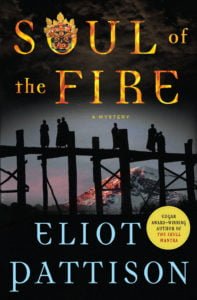 With his first Inspector Shan novel, Eliot Pattison seized the holy grail of mystery writing, the Edgar Award for Best First Novel. “Soul of the Fire” is the eighth book in this series and continues themes established in prior Inspector Shan novels. For this interview, Pattison discussed why he writes what might be called “heavy” novels—deep in complexity and above all, thought provoking.
With his first Inspector Shan novel, Eliot Pattison seized the holy grail of mystery writing, the Edgar Award for Best First Novel. “Soul of the Fire” is the eighth book in this series and continues themes established in prior Inspector Shan novels. For this interview, Pattison discussed why he writes what might be called “heavy” novels—deep in complexity and above all, thought provoking.
“I don’t write escapist pulp,” said Pattison. “My books require an investment of time and emotion. I have always believed that the best books are those which transport the reader to new places and perspectives, that cause the reader to think a little differently about their life and their world. In trying to meet this challenge I weave elements of history, culture, politics and spirituality into my plots and backstories.”
Pattison also said that each of his books is a journey of discovery, both for himself and his readers. Even after having written eight books in this series, he’s driven to learn more. He said, “While I am fairly well-versed in the backdrops of both my Shan books and my colonial America series, I always introduce an element that requires me to dig deeper, to stretch myself so that I can pick up some new knowledge along the way. I want my readers to learn something new but first I want to learn too.”
Tibet and central Asia offer what Pattison refers to as amazingly fertile ground for the novelist. “The geographic, political and cultural landscape has allowed me to develop different, and distinct, perspectives in each of my Shan novels—the plots and backstories have featured Mt. Everest trekking, international art theft, Tibetan medicine, Buddhist reincarnation, the 1904 British invasion of Tibet, and even the fascinating parallels between Tibetans and the tribes of the American Southwest.”
A traveler for most of his life, Pattison regards each book as a journey. He said, “After writing several books in each of my two series, these recurring characters have become close companions on my journeys. They linger at the edge of my consciousness and sometimes appear in my dreams. This years-long companionship makes the writing process flow more fluently since I quickly know how they will react when I throw an obstacle or crisis at them—although sometimes they surprise me.”
Pattison’s “Bone Rattler” series follows an exiled Scot who is caught in the middle of the 18th Century’s French and Indian War. The Inspector Shan series, while current day, deals with the difficult issues surrounding China’s occupation of Tibet. Pattison said, “Embedded in all the Shan books is a reflection of what fifty years of harsh occupation does to a deeply spiritual indigenous people who pay a terrible price for following the non-violent, no-resistance teachings of their religion.
“In this context, ‘Soul of the Fire’ focuses on the wrenching self-immolations that Tibetans resort to as a last, desperate way to protest their treatment by Beijing. Along the way I raise provoking questions about the reaction of the West and the impotence of the United Nations in dealing with human rights issues. Concurrently I explore the effects of occupation on the occupiers; my protagonist in this series is Chinese, and all the Shan books reflect the emotional and spiritual fatigue plaguing those engaged in the deliberate, often violent, dismantling of this unique and vibrant culture.”
Pattison also quoted J. R. R. Tolkien, who once said, “Not all those who wander are lost.” Pattison, however, said his life might be the converse. “I think I might be lost without my wandering. I have traveled all my life, with an ever-changing scope of geography and destinations, and at all levels of the travel food chain. I started in sleeping bags on remote mountains, then youth hostels, and later played the role of the higher end Conde Nast traveler.
“Long ago, however, I came to realize that the experiences we are pushed to seek by the travel establishment often keep us in a bubble, shielded from the experiences that make travel so worthwhile. My destinations are faraway places where I can rediscover wonder, where I can experience childlike humility, where I can realize how ignorant I am of the lives lived by millions. Ultimately those experiences have become my destinations: I travel for the journey, not the bed at the end of the road.”
For more information
Learn more about Eliot Pattison on his website at eliotpattison.com.

